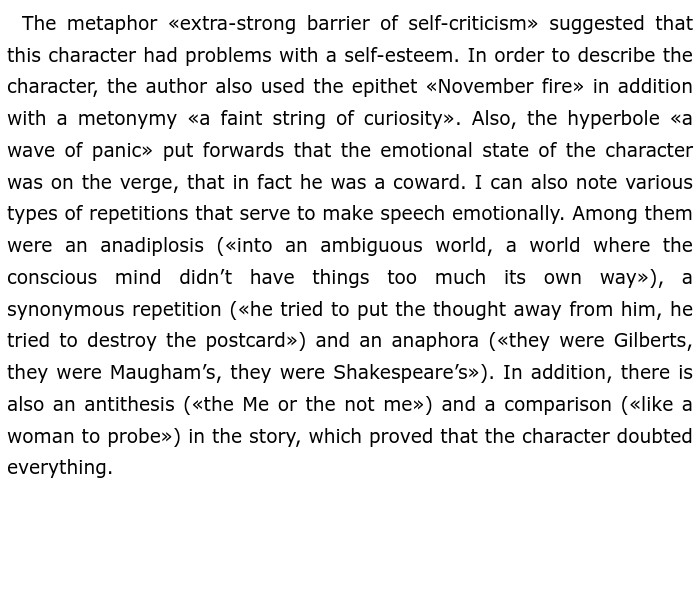|
Вы здесь: Критика24.ру › Английская Литература
From W. S (Английская Литература)The passage under discussion is from the story by Leslie Poles Hartley, who became the worldwide writer thanks his «Complete Short Stories», one of them called «From W. S». The passage in question reveals the story of the writer Walter Streeter, who received 4 strange postcards from an anonymous addressee. The letters didn’t contain an obvious threat, but the tone was ironic and critical, which naturally made the protagonist feel uncomfortable. Accordingly, he burnt them, but something in his soul wished to preserve some of them. His friend suggested that the sender was a lunatic-woman, obsessed with the author. But a few days later, Walter Streeter glanced at the anonymous initials and was shocked by such an odd coincidence. It seemed that initials were his own. Walter turned to the police for the help. However they advised him not to worry, given that the W. S. could be a woman or even someone who never shows up in the flesh. 
The second letter came after 10 days from Berwick-on-Tweed, which immediately began with a question without a greeting. The mood in this letter was amazing, because the addressee again praised the writer with a play on words («a bonderline case»). As in the first letter, there were fixed expressions («plump for one world») as well as negative sentences («I hope it doesn’t sound rude»). As usual, the author ended the letter with his branded initials. I also would like to note that this letter was the longest among all. The third letter had already arrived from the York Minster and, as a rule, without a greeting. This time it was about cathedrals. Once again the author of the letter asked his writer a question, which suggested that he wanted to know even more about Walter. The addressee's mood was an ironic. In the letter, the metaphor «a sign of megalomania» was mentioned, which partly characterized the protagonist. In my opinion, it was his shortest postcard, which wasn’t rich in stylistic devices, except for the epithet («hearty handshake»). The fourth letter had already arrived from Coventry, which began with a wish («I hope you are well»). The mood in this letter was no longer as friendly as in others. The author of the letters wrote dramatically with hidden threats that he was already near. The first thing that caught my eye was a play on words («Have you ever been sent to Coventry»), which made us think that the hero had experienced ignorance on himself. This letter, unlike others, had many stylistic devices. For example, the pass phrase («come to grips») hinted that sending postcards would end soon. There were also a large number of interrogative questions, including the tag question («I advised you to come to grips with your characters, didn’t I»), which showed the anonymous hero's displeasure. Using the metaphor «living in them», the author of the letter seemed to be trying to hint something to us, the readers. The common thing in the four letters was the absence of a greeting, the presence of different kind of sentences, the initials of the author and the special ending. As for the characters, there were only 3 characters in the story: Walter, an anonymous fan and his friend. The author didn’t give us a detailed description of the protagonist's appearance, but demonstrated his psychological state, his feelings and emotions. In practice, we see the character in action and we observe and evaluate his actions. The characterization of the character is revealed by receiving letters. At first glance, I could reckon that this character was a plain by reading only his thoughts. 

In the end, I would like to conclude that with every word in the text, the author keeps our attention in suspense. Sometimes he makes us, the readers, wonder at the writer's thoughts; sometimes he makes us sympathize with the main hero. This is the major reason why I was a sucker for this story so much. Обновлено: Опубликовал(а): Алия Гайсина Внимание! Спасибо за внимание. |
|


